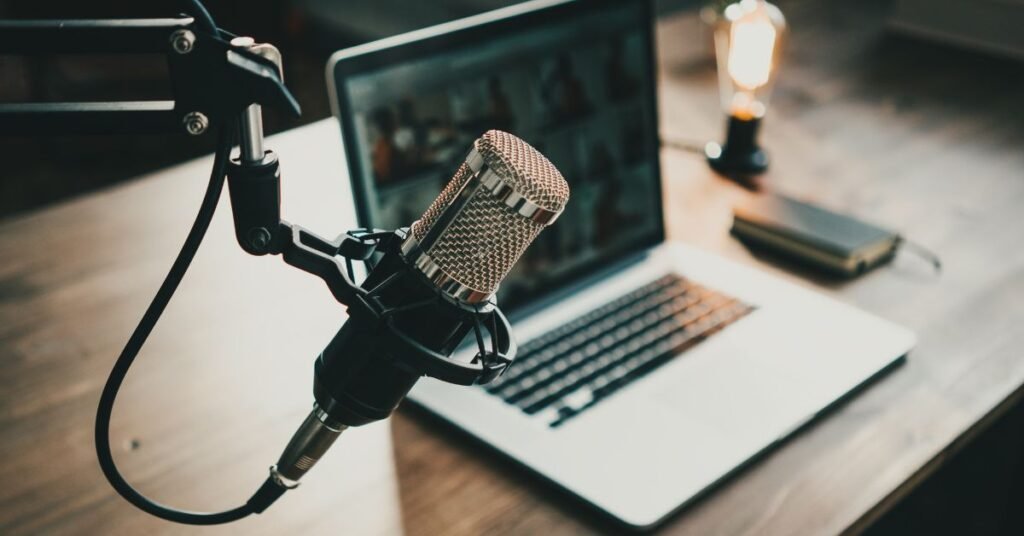Short Answer:
Podcasts are increasingly popular due to their convenience, personal touch, and wide variety of topics. They’re easy to listen to on demand, connect listeners with hosts like friends, and cover interests for all. Affordable to produce and supported by modern technology, they fit perfectly into our daily lives.
Podcasts have become a major part of modern media, captivating the attention and curiosity of millions all over the world. But what makes podcasts so captivating? From their early days in the 2000s with devices like MP3 players and iPods, podcasting has grown into a rich, easily accessible platform offering content for every taste.
Whether you’re into business tips, comedy skits, or crime stories, there’s likely a podcast that fits your interests. What makes podcasts special is their flexibility and how seamlessly they blend into our lives, providing a unique mix of entertainment, information, and personal connection.
Why Are Podcasts So Popular?

1. A Brief History of Podcasting
Podcasts have come a long way since they started in the early 2000s. The term “podcasting” is inspired by Apple’s iPod, one of the first devices to make portable audio widely available. At first, podcasts were distributed via podcast RSS feeds, allowing listeners to subscribe and automatically get new episodes.
This was a huge innovation because it allowed people to enjoy content whenever they wanted—a concept further popularized by successful shows like “This American Life” and the true-crime hit “Serial.” These shows helped bring podcasts into the spotlight. With the rise of smartphones and fast internet, downloading or streaming episodes anytime, anywhere became easy, boosting the podcasting trend even more.
2. The Appeal of On-Demand Audio
A major draw of podcasts is that they’re available whenever you want. In our hectic world, where time is precious and schedules are busy, being able to choose what to listen to and when is priceless.
Just as streaming services for TV shows became popular because they freed viewers from rigid TV schedules, podcasts let listeners enjoy their favorite topics without being tied to a specific time. Whether you’re commuting, exercising, or doing chores, podcasts can fit right into your day when reading or watching isn’t convenient.
3. Personalized Storytelling and Intimacy
Podcasts often feel more personal than other media types. Hosts speak directly to their audience, creating a sense of a one-on-one conversation. This intimate storytelling helps hosts form what are known as parasocial relationships with listeners—connections where the audience feels bonded to the host like a friend. The conversational and authentic nature of podcasts is also appealing because listeners crave the real, genuine chats often missing from highly edited traditional media.
Accessibility and Ease of Use
1. Accessible Creation and Low Production Costs
For creators, starting a podcast is relatively easy and inexpensive. Unlike video production, which might need a studio, professional lighting, and a team, a podcast can be launched with a good microphone and some editing software.
This low barrier to entry has inspired many creators, from individual storytellers to major media companies, to produce content that might not fit traditional media constraints.
Plus, there’s the potential to earn money through sponsorships, ads, and listener support platforms like Patreon, which adds a business incentive to podcasting.
2. Flexible Listening and Niche Topics
Podcasts cater to a wide range of interests, making them attractive to many listeners. Like online forums or specific interest blogs, podcasts can focus on specialized topics that may not have broad mass appeal but deeply resonate with specific audiences.
Whether someone is interested in astrophysics, knitting, or true crime, there’s typically a podcast that matches their curiosity. This focused content builds loyal communities, and many listeners appreciate the wide variety and depth of podcasts compared to other media.
3. Technological Advancements
Technology has played a huge role in the rise of podcasts. Integrating podcasts into everyday gadgets—like smart speakers such as Amazon Echo or Google Home, and smartphones—has made accessing podcasts almost effortless.
These innovations have also opened up new ways to engage audiences, including interactive podcast experiences and seamless integration with car entertainment systems. As technology keeps advancing, podcasts are expected to become even more integrated into our routines, providing even more convenience and enjoyment.
Comparison to Traditional Media

Podcasting hasn’t just developed into a remarkable medium; it’s also changed the way we listen to audio content. Comparing podcasts to traditional media forms like radio and video helps us appreciate their popularity.
1. Podcasts vs. Radio
Podcasts shake up the traditional radio landscape in fantastic ways:
- On-Demand vs. Scheduled Listening: Radio has fixed schedules, but podcasts let you listen anytime, anywhere. You don’t have to miss a show due to a busy day because you can play it whenever you’re ready.
- Global Reach: Radio signals are usually local, but podcasts go global—anyone with internet can listen. Whether you’re in New York or New Zealand, you can hear the same episode.
- Variety and Depth: Radio follows strict formats and time limits. In contrast, podcasts come in all shapes and sizes—some are quick bites of advice, others offer long deep dives, opening up space for niche interests that radio might not cover as thoroughly.
2. Podcasts vs. Video Content
When comparing podcasts to video, there are key differences that make podcasts the preferred choice for many:
- Mobility and Convenience: Listening to a podcast doesn’t require watching a screen. Whether you’re jogging or commuting, your podcast plays alongside your activities. Videos require your eyes too, making them less suitable for multitasking.
- Ease of Production: For creators, making a podcast is much simpler than producing a video. You can create quality content with just a microphone and editing software, skipping the need for expensive gear like cameras.
- Listener Retention: Podcasts often have higher retention rates because listening is easier and less demanding than watching. Enjoying a podcast can feel as effortless as a chat with an old friend.
Impact on User Engagement

One of the most compelling aspects of podcasts is how they engage listeners. The sense of connection and community they create sets them apart from traditional media.
1. Meeting the Demand for Authentic Content
There’s a big desire for genuine, relatable content today, and podcasts deliver:
- Conversational Format: Podcasts’ freeform style allows for honest conversations that resonate with listeners. Unlike scripted shows or polished news, podcasts welcome spontaneity and sincerity—a freshness that’s appealing in a world full of filtered social media.
- Diverse Voices: Podcasts have democratized content production, giving marginalized voices a platform. Shows focusing on social justice, LGBTQ+ issues, and minority perspectives thrive, presenting stories and views that mainstream media might overlook.
2. Building Community and Listener Loyalty
Podcasts aren’t just about content—they’re about connecting people:
- Parasocial Relationships: Podcasters build bonds with their listeners by sharing personal experiences and insights. Regular listeners grow to feel a kinship, as if the host is a close friend or mentor, bringing them back for future episodes.
- Community Engagement: Many podcasts create communities beyond episodes. Social media groups, live events, and listener forums become parts of the podcast, making audiences feel part of something bigger and fostering strong loyalty.
Podcasts keep attracting audiences because they’re dynamic like us. They offer not only entertainment but a sense of belonging. Whether you’re diving into true crime stories or pursuing a niche interest, a podcast is always there to welcome you.
Conclusion
In conclusion, podcasts have woven themselves into our daily routines, providing entertainment, education, and companionship at our convenience. Their surge in popularity is largely due to their easy access, diverse content, and the intimate bond they create between hosts and listeners. Whether you’re into true crime, comedy, or business tips, there’s a podcast perfect for you. As technology advances and more niche markets emerge, podcasts will continue to be an essential part of media consumption, constantly evolving to meet the needs and interests of their audience.

